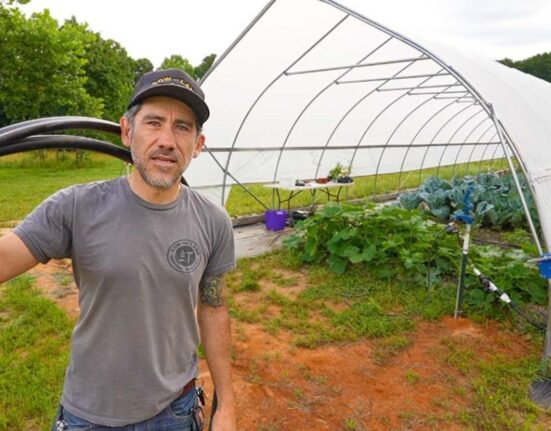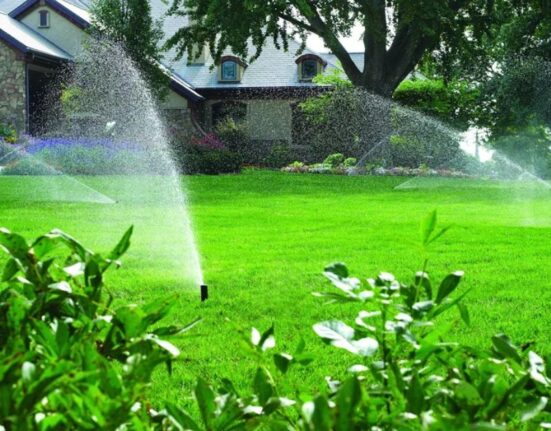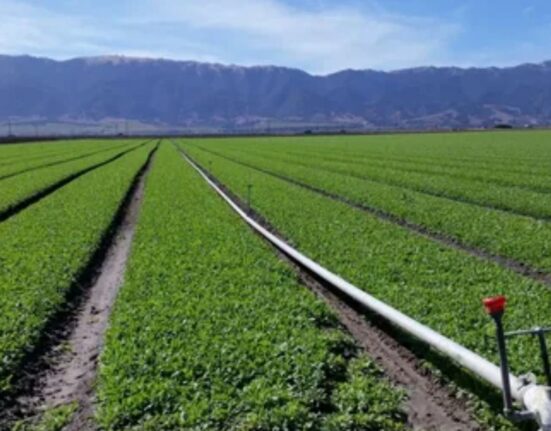Sustainable Irrigation Smart Water Management for a Greener Future uses advanced technology, often called “smart irrigation systems,” to precisely deliver water to crops based on real-time soil moisture and weather data. This significantly reduces water waste and promotes environmentally responsible agriculture, ultimately contributing to a more sustainable future by conserving precious water resources. Sustainable irrigation offers a solution by optimizing water use, reducing waste, and ensuring long-term agricultural productivity while protecting natural resources. Farmers, landscapers, and communities can adopt innovative water management practices to improve crop yields, conserve water, and contribute to a healthier environment.
In this blog post, we will explore the concept of sustainable irrigation, its key principles, innovative techniques, and the benefits it brings to agriculture and the planet. Let’s dive into the future of smart irrigation and how it can help build a greener and more water-efficient world.
Understanding Sustainable Irrigation


Sustainable irrigation is a water management approach that aims to maximize agricultural productivity while minimizing water waste and environmental impact. It focuses on using water efficiently, ensuring that crops receive the right amount of moisture without unnecessary depletion of natural resources. This method conserves water, enhances soil health, reduces energy consumption, and supports long-term agricultural sustainability.Traditional irrigation systems, such as flood or overhead sprinklers, often result in excessive water loss due to evaporation, Flood Irrigation Pros and Cons runoff, and inefficient distribution. In contrast, sustainable irrigation techniques prioritize precision and efficiency. Methods like drip irrigation, rainwater harvesting, and innovative irrigation systems help deliver water directly to plant roots, reducing waste and optimizing absorption.
Farmers and landowners can achieve higher crop yields by adopting sustainable irrigation practices while conserving water for future generations. This approach is crucial in addressing the challenges of water scarcity, climate change, and increasing food demand. Sustainable irrigation benefits agriculture and is vital in preserving ecosystems and promoting responsible water use worldwide.
Adopting Smart Irrigation Systems
Although innovative irrigation systems offer clear advantages, their implementation can be complex. Farmers and agribusinesses must evaluate several key factors before integrating these technologies:
- Farm Size and Layout: The scale and terrain of the farm determine the most suitable system.
- Crop Requirements: Different crops have unique water needs, influencing system design.
- Soil Composition: Soil type impacts water retention and distribution efficiency.
- Climate Considerations: Local weather patterns play a vital role in irrigation planning.
- Existing Infrastructure: Current irrigation setups may require modifications or upgrades.
- Budget and ROI: While the initial investment can be high, long-term savings and efficiency gains are substantial.
Many agricultural technology providers offer end-to-end solutions, including system design, installation, and maintenance, to streamline adoption.
The Power of Data in Smart Irrigation
Data is the backbone of intelligent irrigation systems, enabling precise and efficient water management. These systems gather, analyze, and utilize vast information to optimize irrigation. Key data points include:
- Real-time soil moisture levels to determine when watering is necessary.
- Weather forecasts and historical climate data for predictive irrigation planning.
- Crop growth stages and health indicators to adjust water distribution accordingly.
- Evapotranspiration rates to estimate water loss and adjust irrigation schedules.
- Water flow and pressure measurements to ensure efficient system performance.
By leveraging this data, How Can Farmers Cut Waste in Sustainable Agriculture intelligent irrigation systems make informed decisions on when, where, and how much water to apply. This data-driven approach conserves water and enhances crop health and overall farm productivity.
The Future of Agricultural Water Management
The future of agricultural water management holds immense potential, with emerging technologies set to revolutionize irrigation practices. Key innovations include:
- AI and Machine Learning: Advanced algorithms will refine irrigation strategies by learning from historical trends and real-time data.
- IoT Integration: Enhanced connectivity between farm devices will create more responsive and automated irrigation systems.
- Blockchain for Water Trading: Secure and transparent water allocation systems may improve resource distribution among farmers.
- Nanotechnology Sensors: Ultra-sensitive sensors will provide even more precise measurements of soil moisture and plant health.
- Genetic Engineering: Developing drought-resistant crop varieties will complement smart irrigation, further optimizing water use.
These advancements will push the boundaries of water efficiency, enabling farmers to produce more with less water while minimizing environmental impact.
Real-World Success Stories in Smart Irrigation


Farmers worldwide are already benefiting from innovative irrigation technologies. Here are a few standout examples:
- California Almond Orchards: Precision irrigation techniques have reduced water use by 20% while maintaining or improving yields.
- Australian Cotton Farms: Smart irrigation has increased water use efficiency by up to 40%, proving essential in drought-prone regions.
- Indian Sugarcane Plantations: Drip irrigation and intelligent scheduling have led to 30–50% water savings and 15–25% yield improvements.
These case studies highlight the transformative impact of intelligent irrigation systems, demonstrating their ability to enhance efficiency, sustainability, and profitability in agriculture worldwide.
How Traditional Irrigation Systems Waste Water
While conventional irrigation methods have helped farmers boost productivity, they often lead to significant water waste. Key issues include:
- Poor Water Management: Traditional irrigation relies on manual control, requiring farmers to turn water on and off without precise data. This often results in overwatering, as no real-time feedback on soil moisture levels exists.
- Inefficient Irrigation Schedules: Many standard systems use preset controllers and timers, watering crops based on a fixed schedule rather than actual needs. The Complete Beginner’s Guide to Drip Irrigation These systems can apply too much water if not properly programmed, leading to unnecessary waste.
- Soil Erosion: Overwatering caused by traditional irrigation methods can lead to soil erosion. Excess water runoff washes away fertile topsoil, reducing soil quality and negatively impacting crop yields.
These inefficiencies highlight the need for more advanced, data-driven irrigation solutions that optimize water use and improve sustainability.
Benefits of Sustainable Irrigation
Sustainable irrigation offers numerous advantages for farmers, agricultural industries, the environment, and society. By optimizing water use and reducing waste, this approach contributes to a more efficient and responsible water management system.One of the most significant benefits of sustainable irrigation is water conservation. Traditional irrigation methods often lead to excessive water loss through evaporation and runoff, while sustainable techniques like drip irrigation and rainwater harvesting ensure that every drop is used effectively. This helps preserve freshwater resources, making them available for future generations.Another key advantage is improved soil health. Overwatering can lead to soil erosion and nutrient depletion, affecting crop productivity. Sustainable irrigation methods maintain the proper moisture balance, enhancing soil fertility and plant growth. Additionally, these practices help reduce energy consumption and costs, as more efficient water distribution minimizes the need for excessive pumping and irrigation system operation.
From an environmental perspective, sustainable irrigation reduces pollution and protects ecosystems. Minimizing water runoff prevents harmful fertilizers and pesticides from contaminating nearby water bodies. Moreover, sustainable irrigation enhances climate resilience, helping farmers adapt to changing weather patterns and drought conditions Top Tips For Better Surface Irrigation .Sustainable irrigation leads to higher agricultural productivity, cost savings, and a healthier environment, making it an essential step toward a greener and more water-efficient future.
Challenges and Solutions
While sustainable irrigation offers numerous benefits, its implementation comes with several challenges. Farmers, policymakers, and communities must work together to overcome these obstacles and ensure efficient water management. Below are some key challenges and their potential solutions.
High Initial Costs
One of the most significant barriers to adopting sustainable irrigation methods is the upfront investment required for advanced systems like drip irrigation, smart controllers, and rainwater harvesting infrastructure. Many farmers, especially small-scale ones, struggle to afford these technologies.
Solution:
- Governments and organizations can offer subsidies, grants, and low-interest loans to support farmers adopting sustainable irrigation.
- Encouraging cost-effective, locally made irrigation solutions can reduce expenses.
- Implementing sustainable practices in phases can ease the financial burden.
Lack of Awareness and Education
Many farmers and landowners are unaware of sustainable irrigation techniques or lack the technical knowledge to implement them effectively. 5 Common Mistakes In Sprinkler System Design Even efficient irrigation systems can be misused without proper training, leading to water waste.
Solution:
- Conducting workshops, training programs, and awareness campaigns can help farmers understand sustainable irrigation’s benefits and proper use.
- Digital tools, such as mobile apps and online resources, can easily access irrigation management information.
- Encouraging knowledge-sharing among farmers through cooperative networks can promote best practices.
Policy and Regulation Gaps
In many regions, there is a lack of clear policies and regulations promoting water-efficient irrigation. Weak enforcement of water conservation laws can lead to overuse and depletion of water resources.
Solution:
- Governments should develop and enforce policies that encourage sustainable irrigation, such as water use restrictions, incentives for efficiency, and penalties for excessive usage.
- Integrating water management into national agricultural policies can ensure long-term sustainability.
- Strengthening partnerships between government agencies, research institutions, and private sectors can lead to better innovation and implementation.
Climate Change and Water Scarcity


Rising temperatures, unpredictable rainfall patterns, and prolonged droughts make water availability uncertain, posing a significant challenge to irrigation.
Solution:
- Adopting climate-resilient irrigation systems, such as soil moisture sensors and automated weather-based irrigation, can optimize water use.
- Promoting drought-resistant crops can help reduce dependency on excessive irrigation.
- Enhancing water storage infrastructure, such as reservoirs and rainwater harvesting systems, can provide a stable water supply during dry periods.
By addressing these challenges with innovative and practical solutions, sustainable irrigation can become more accessible and effective, ensuring long-term water conservation and agricultural productivity.
Conclusion
Sustainable irrigation ensures efficient water use, protects the environment, and supports long-term agricultural productivity. With increasing water scarcity and the growing demand for food, adopting innovative water management practices is no longer an option but a necessity. By using efficient irrigation techniques such as drip irrigation, rainwater harvesting, and innovative irrigation systems, we can significantly reduce water waste and improve soil health.Despite challenges such as high initial costs, lack of awareness, and climate change impacts, solutions like government incentives, farmer education, and innovative technologies can help make sustainable irrigation more accessible. Collaboration between farmers, policymakers, and researchers is key to implementing these practices effectively.
By embracing sustainable irrigation, we can create a future where water is conserved, crops thrive, and the environment remains protected. It is time for individuals, communities, and industries to take action and invest in innovative water management for a greener and more sustainable world.
FAQ
What is the future work of innovative irrigation systems?
As plants receive the right amount of water when needed due to smart irrigation, agribusinesses can significantly decrease overwatering to preserve natural resources. Improve crop yields. Innovative systems deliver the optimal amount of water to plants so you can increase crop productivity and quality.
What is a sustainable method of irrigation?
The best sustainable irrigation technique by far is drip irrigation. Drip irrigation is a system of pumps and tubes. The tubes are suspended above the soil or planted alongside the plant’s roots.
What is an innovative water irrigation system?
Innovative irrigation technology uses weather or soil moisture data to determine the landscape’s irrigation needs. It includes products that maximize irrigation efficiency by reducing water waste while maintaining plant health and quality.
What is the future of water management?
Moreover, a lack of balance between the demand and supply parameters poses a challenge. Hence, the future should focus on sustainable development and preventing the depletion of water resources.
How effective is smart irrigation?
Intelligent irrigation systems can cut water use by 40% to over 70%, depending on the setup and conditions. That’s a massive win in water-stressed areas. By reducing the need for pumping and distribution, smart irrigation also saves energy. In fact, some IoT-based systems have slashed energy use by up to 30%






